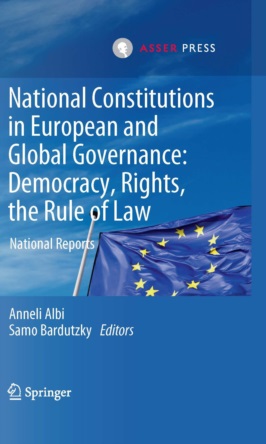
National Constitutions in European and Global Governance: Democracy, Rights, the Rule of Law - National Reports
May 2019Order
Details
- Published: May 2019
- Pages: XX + 1527 pp., 1 ill. (fc)
- Publisher: T.M.C. ASSER PRESS
- Distributor: Springer
- Formats: Hardcover, eBook and online on SpringerLink
- ISBN: 978-94-6265-272-9
- E-ISBN: 978-94-6265-273-6
This two-volume book, published open access, brings together leading scholars of constitutional law from twenty-nine European countries to revisit the role of national constitutions at a time when decision-making has increasingly shifted to the European and transnational level. It offers important insights into three areas. First, it explores how constitutions reflect the transfer of powers from domestic to European and global institutions. Secondly, it revisits substantive constitutional values, such as the protection of constitutional rights, the rule of law, democratic participation and constitutional review, along with constitutional court judgments that tackle the protection of these rights and values in the transnational context, e.g. with regard to the Data Retention Directive, the European Arrest Warrant, the ESM Treaty, and EU and IMF austerity measures. The responsiveness of the ECJ regarding the above rights and values, along with the standard of protection, is also assessed. Thirdly, challenges in the context of global governance in relation to judicial review, democratic control and accountability are examined. On a broader level, the contributors were also invited to reflect on what has increasingly been described as the erosion or ‘twilight’ of constitutionalism, or a shift to a thin version of the rule of law, democracy and judicial review in the context of Europeanisation and globalisation processes.
The research for this publication and the comparative study were carried out within the framework of the ERC-funded project ‘The Role and Future of National Constitutions in European and Global Governance’.
The book is aimed at scholars, researchers, judges and legal advisors working on the interface between national constitutional law and EU and transnational law. The extradition cases are also of interest to scholars and practitioners in the field of criminal law.
Anneli Albi is Professor of European Law at the University of Kent, United Kingdom.
Samo Bardutzky is Assistant Professor of Constitutional Law at the University of Ljubljana, Slovenia.
Specific to this book:
- A key comparative reference book, with each report systematically structured to cover the same themes.
- Each report contains constitutional amendments, constitutional challenges to the Data Retention Directive, the European Arrest Warrant, the ESM Treaty, austerity cases, judicial review and democratic control in global governance.
- This book takes a bottom-up approach and makes available case law and constitutional debates in the Member States, including those that are considered more peripheral.
- The national reports contain a wealth of assessments and practical policy recommendations from constitutional experts.
- The above-mentioned policy recommendations regard how some of the challenges in the European constitutional and judicial dialogues could be addressed.
WINNER OF THE CONTRIBUTION OF THE YEAR AWARD OF THE ESTONIAN ACADEMY OF SCIENCES CONSTITUTIONAL LAW FOUNDATION
Contribution of the Year Award of the Estonian Academy of Sciences Constitutional Law Foundation Given to Anneli Albi
On 8 October 2020, it was announced that this two-volume book analysing the nature and functioning of Europe’s national constitutions, has been awarded the Contribution of the Year Award of the Estonian Academy of Sciences Constitutional Law Foundation.
For more information, see Contribution of the Year Award of the Estonian Academy of Sciences Constitutional Law Foundation
Excerpts from a book review:
The book is ‘an excellent starting point for internal national debate, in terms of how to better shape Estonia’s European Union policy. Several of the themes raised in the analysis also merit discussion at the […] Conference on the Future of the Union.’
The book reviewer found ‘surprising or particularly important in the Estonian context’ the following developments identified in the book: ‘change of gravity in the centre of the balance of powers and the increase in the executive power’; ‘the extensive curtailing of fundamental rights’ in the field of European Arrest Warrant and Data Retention Directive; ‘the impact of European Union law on the principles of the social state and the protection of social rights’; and ‘the change in the interpretation of the principles of legal certainty and proportionality’.
The book reviewer further found that ‘What is even more problematic is that the diversity [of the constitutional orders] has not been lost consciously, but it has at times been a natural side-effect of European Union law. This means that the national legal orders of the Member States have not been able to systematically prepare for such side-effects and such questions have not been substantively analysed at the level of European Union or the Member States’.
- Dr Katre Luhamaa, Lecturer in EU and International Law, University of Tartu
Raamatuarvustus [Book review].
Book review published in: Riigiõiguse aastaraamat [Constitutional Law Yearbook] 2021, Tartu, pp. 411-418 (in Estonian).
Available via Open Access at https://www.juridica.ee/article.php?uri=2021_riigi_iguse_aastaraamat_2021_raamatuarvustus_i_national_constitutions_in_european_and_global_go
